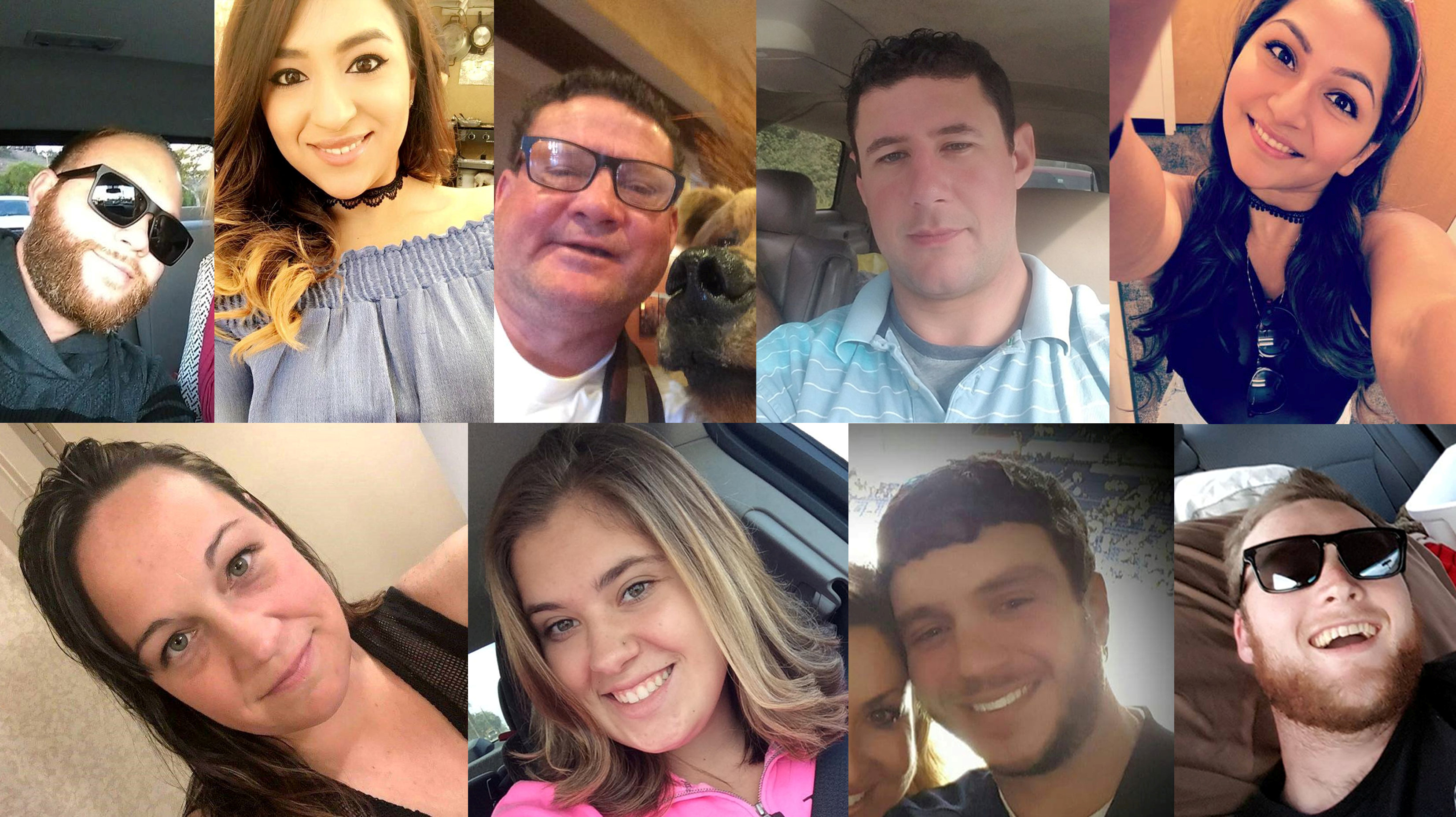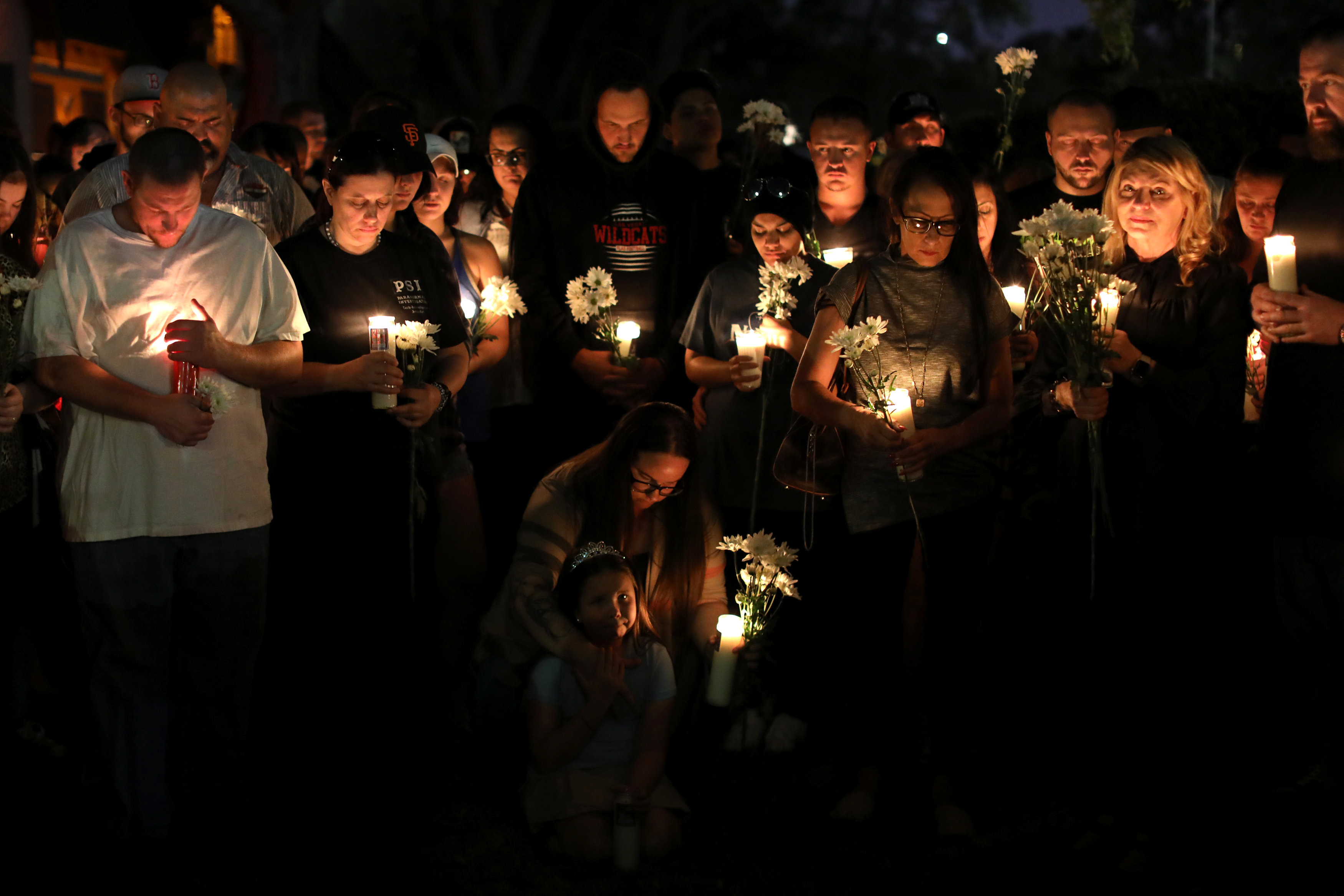
By Sharon Bernstein and Alexandria Sage
LAS VEGAS (Reuters) – The quest by police to comprehend why a retiree shot 58 people to death in Las Vegas has turned to the gunman’s girlfriend, who has flown back to the United States from the Philippines facing investigators’ questions about what she knew of his motives.
Stephen Paddock, who killed himself moments before police stormed the hotel suite he had transformed into a sniper’s nest on Sunday night, left no clear clues as to his reasons for staging the deadliest mass shooting in modern U.S. history.
But law enforcement authorities were hoping to obtain some answers from the woman identified as Paddock’s live-in companion, Marilou Danley, who Clark County Sheriff Joseph Lombardo called a “person of interest” in the investigation.
Danley boarded a Philippine Airlines passenger jet in Manila, where she had traveled to before the shooting rampage, for a non-stop flight to Los Angeles International Airport, landing there as scheduled on Tuesday night.
A police official in Manila, the Philippines capital, and a law enforcement official in the United States, both speaking on condition of anonymity, told Reuters that Danley was being met by Federal Bureau of Investigation agents in Los Angeles.
The U.S. source said Danley was not under arrest but that the FBI hoped she would consent to be interviewed voluntarily.
Investigators were examining a $100,000 wire transfer Paddock sent to an account in the Philippines that “appears to have been intended” for Danley, a senior U.S. homeland security official told Reuters on Tuesday.
The official, who has been briefed regularly on the probe but spoke on condition of anonymity, said the working assumption of investigators was that the money was intended as a form of life insurance payment for Danley.
Danley’s return to the United States is the latest development in a case which has baffled investigators for its lack of any apparent motive by the killer. It comes ahead of a condolence visit by President Donald Trump to Las Vegas on Wednesday.
Trump, who strongly supported gun rights during his bid for the White House, now confronts for the first time as president the tragic aftermath of deadly firearms violence that has routinely claimed hundreds of lives in recent years.
On Tuesday, he referred to Paddock as “a sick man, a demented man,” and in response to renewed calls for tougher gun control measures, said, “we’ll be talking about gun laws as time goes by.”

A combination photo of victims of the October 1, 2017 mass shooting at the Mandalay Bay in Las Vegas, seen in these undated social media photos obtained by Reuters October 3, 2017. They are (top L-R) Christopher Christopher Roybal, Melissa Ramirez, Jack Beaton, Adrian Murfitt, Angie Gomez, (bottom L-R) Jessica Klymchuk, Bailey Schweitzer, Sonny Melton, and Jordan McIldon. Social media/Handout via REUTERS/File Photo
MONEY TRAIL TO PHILIPPINES
In Las Vegas, police acknowledged being stymied in their initial attempts to determine what drove Paddock, 64, to assemble an arsenal of high-powered weapons in a 32nd-floor hotel suite and unleash a barrage of gunfire onto an crowded outdoor concert below.
Investigators hope Danley may shed some additional light on the carnage, carried out by an individual with no criminal record, no known history of mental illness and no outward signs of social disaffection, political discontent or extremist ideology.
Danley, an Australian citizen reported to have been born in the Philippines, had been sharing Paddock’s condo at a retirement community in Mesquite, Nevada, about 90 miles (145 km) northeast of Las Vegas, according to police and public records.
The homeland security official said U.S. authorities were eager to question Danley, who described herself on social media websites as a “casino professional,” mother and grandmother, about whether Paddock encouraged her to leave the United States before he went on his rampage.
“He sent her away so that he can plan what he is planning without interruptions, in that sense I thank him for sparing my sister’s life, but that won’t be to compensate the 59 people’s lives,” two of her sisters told Australia’s Seven Network television.
Danley’s sisters, whose full identities were shielded by the television station, said that Paddock bought her a ticket to the Philippines.
“No-one can put the puzzles together. No-one except Marilou, because Steve is not here to talk anymore. Only Marilou can maybe help,” they said.
Danley arrived in Manila on Sept. 15, more than two weeks before the mass shooting in Las Vegas, then flew to Hong Kong on Sept. 22 and returned in Manila on Sept. 25. She was there until she flew to Los Angeles on Tuesday night, according to a Philippines immigration official.
A Philippine police source said authorities in Manila were told that Paddock used identification belonging to Danley, who has an Australian passport, when checking into the Mandalay Bay hotel on the Las Vegas Strip.
Both the Philippines immigration official and police source spoke to Reuters on condition of anonymity.
The U.S. official said investigators had also uncovered evidence that Paddock may have rehearsed his plans at other venues before ultimately carrying out his attack on the Route 91 Harvest country music festival near the Mandalay Bay hotel.

A candlelight vigil is held at Zack Bagans Haunted Museum in remembrance of victims following the mass shooting along the Las Vegas Strip in Las Vegas, Nevada, U.S., October 3, 2017. REUTERS/Mike Blake
ARSENAL RECOVERED
Fresh details about the massacre Paddock’s weaponry emerged on Tuesday.
Police said Paddock strafed the concert crowd with bullets for nine to 11 minutes before taking his own life, and had set up cameras inside and outside his hotel suite so he could see police as they closed in on his location.
A total of 47 firearms were recovered from three locations searched by investigators – Paddock’s hotel suite, his home in Mesquite, and another property associated with him in Reno, Nevada, according to Jill Snyder, special agent for the U.S. Bureau of Alcohol Tobacco and Firearms (ATF).
Snyder said 12 of the guns found in the hotel room were fitted with so-called bump-stock devices that allow the guns to be fired virtually as automatic weapons. The devices are legal under U.S. law, even though fully automatic weapons are for the most part banned.
The rifles, shotguns and pistols were purchased in four states – Nevada, Utah, California and Texas – Snyder told reporters at an evening news conference.
A search of Paddock’s car turned up a supply of ammonium nitrate, a fertilizer that can be formed into explosives and was used in the 1995 Oklahoma City bombing of a federal office building that killed 168 people, Lombardo said earlier.
Police also confirmed that photos widely published online showing the gunman’s body, his hands in gloves, lying on the floor beside two firearms and spent shell casings, were authentic crime-scene images obtained by media outlets. An internal investigation was under way to determine how they were leaked.
Video footage of the shooting spree on Sunday night caught by those on the ground showed throngs of people screaming in horror, some crouching in the open, hemmed in by fellow concert-goers, and others running for cover as extended bursts of gunfire rained onto the crowd of some 20,000.
Police had put the death toll at 59 earlier on Tuesday, not including the gunman. However, the coroner’s office revised the confirmed tally to 58 dead, plus Paddock, on Tuesday night.
More than 500 people were injured, some trampled in the pandemonium. At least 20 of the survivors admitted to one of several hospitals in the area, University Medical Center, remained in critical condition on Tuesday, doctors said.
The union representing firefighters disclosed that a dozen off-duty firefighters who were attending the music festival were shot while trying to render aid to other spectators, two of them while performing cardiopulmonary resuscitation on victims.
“This is a true feat of heroism on their part,” said Ray Rahne of the International Association of Fire Fighters.
The gunman’s brother, Eric Paddock, said his family did not plan to hold a funeral for his brother, who was not religious, in part because it could attract unwanted attention. He previously described his brother as a financially well-off enthusiast of video poker and cruises.
The death toll of Sunday’s shooting far surpassed the massacre of 26 young children and educators in Newtown, Connecticut, in 2012, and the slaying of 49 people at a gay nightclub in Orlando last year.
The latter attack was previously the deadliest mass shooting in modern U.S. history.
(Additional reporting by Lisa Girion in Las Vegas, Jonathan Allen and Frank McGurty in New York, John Walcott, Susan Cornwell, Doina Chiacu and Jeff Mason in Washington, Bernie Woodall in Fort Lauderdale, Florida, Lisa Baertlein in Los Angeles, Jon Herskovitz in Austin, Texas and Brendan O’Brien in Milwaukee; Writing by Steve Gorman; Editing by Toby Chopra)















